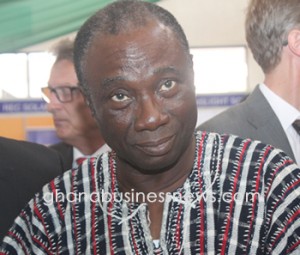Ghana’s dollar denominated power sector creating liquidity challenges – Minister

Dr Kwabena Donkor, Minister of Energy on Thursday noted that 70 per cent of power cast in the country is dollar denominated, leading to liquidity challenges.
He said the revenue stream also started deteriorating since 2013 and as a result the Volta River Authority is virtually working to pay the commercial banks.
Dr Donkor made this known at a maiden Editors Forum in Accra, to explain the current power challenges and the essence to educate and sensitise the public about the developments in the Power Ministry to tackle the problem.
Flanked by top ranking officials in the ministry and other players in the energy sector, Dr Donkor explained a number of steps taken to boost energy generation and clarified certain allegations attributed to him, which has gained him bad press, as a result of the power crises popularly referred to as “dumsor”.
Some of the issues he touched on were meant to be off record as agreed upon per the suggestion of the Moderator of the forum, Mr Kabral Blay-Amihere, Chairman of the National Media Commission.
To Mr Blay-Amihere a frank talk by the Minister modeled along the erstwhile Encounter with the Media introduced by the Ghana Journalists Association, would soften the grounds for journalists to visit the Power Ministry to pursue follow ups.
Dr Donkor said despite the power crises, the country’s access to power is 80.5 per cent, which is almost at par with South Africa.
He said by 2020 the country’s universal access to power would hit 90 per cent penetration or more, adding: “I believe Ghana could achieve the target before 2020.”
The Minister said Ghana has the lowest tariffs in the West Africa Sub-Region due to hydro-electric power.
However as a result of structural and other difficulties power deficit has hit 40 per cent penetration and by December hydro-electric power would be far low in the national generation mix.
Dr Donkor attributed the shortfall to the Akosombo Dam, which is experiencing diminishing production every year, which comes with serious cost implications.
“Somebody should pay for the cost,” he said.
Dr Donkor said unfortunately the nation has exhausted all the hydro generation capabilities, and as hydro-power generation diminishes demand is growing at about 12 per cent per annum and is a cause for concern.
He announced a three-prone solution to the problem, which includes the nation’s ability to generate more power in order to have an 18-20 per cent power reserve to help offset the current power deficits.
These include the Sunon-Asogli Power Limited project, the Kpong Power Plant, the on-going Aboadze Thermal Plant project and the Takoradi-based Tico Power Station and the Cat Power Plant project.
The Minister said through these interventions the country is likely to break the generation deficit.
The medium term plan is eyeing the Cenpower Power Generation which would be ready in 2017, whilst the Sunon-Asogli Power Limited would introduce coal power based generation known to be the cleanest globally.
Dr Donkor said the country is focusing on 2,000 megawatts coal power plant as a long term vision.
He said although people are pushing for solar energy as an alternative source of power, it is not economic viable, while the nation had under invested in the sector for a long time.
Dr Donkor said besides other infrastructural challenges solar energy is not needed at the peak power supply point when energy from the sun had waned in the night.
Notwithstanding the Energy Commission has authorised the mounting of 200,000 top building solar panels for domestic use.
Dr Donkor also explained that the perception that Ghana has large deposits of indigenous gas reserve to power the local thermal plants is not authentic.
He said the country has about five trillion standard cubic feet of gas, which cannot be compared with Mozambique with about 200 trillion standard cubic feet of the resource.
Dr Donkor said Ghana would therefore be compelled to keep on importing gas.
He stressed that based on all the efforts his sector Ministry is making the power crises could end by December, but he cannot guarantee power outages, which are caused by obsolete equipment and other technical challenges.
Source: GNA
